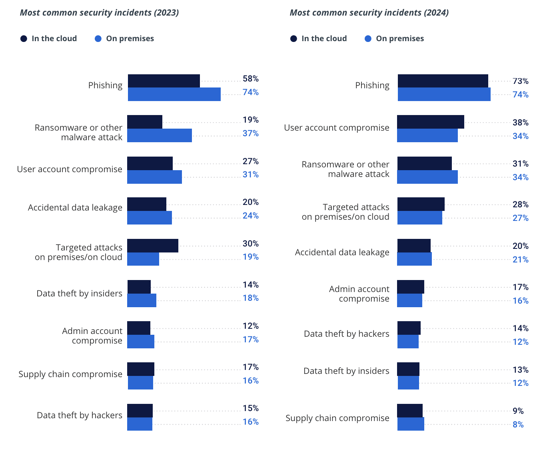 Regardless of whether your environment is on-premises, in the cloud or hybrid, new data makes it clear that users are the top cybersecurity concern, and we cover what you can do about it.
Regardless of whether your environment is on-premises, in the cloud or hybrid, new data makes it clear that users are the top cybersecurity concern, and we cover what you can do about it.
According to Netwrix’s 2024 Hybrid Security Trends Report, 79% of organizations experience one or more security incidents in the last 12 months. This is a 16% increase from the previous year, demonstrating that attacks are not subsiding one bit and that they are increasingly successful.
It also appears that the consequences of these attacks are significant; while 38% of organizations said they felt no impact from the attacks they experienced, there were some serious repercussions listed in the report:
- 45% had unplanned expenses to address the newly-found security gaps
- 20% said they lost their competitive edge
- 17% had to pay compliance fines
- 16% had a decrease in company valuation
- 14 % experienced customer churn
These are all material impacts to any business. So, let’s do a bit more digging and figure out why all these attacks are happening (so you can improve your ability to stop them) by looking at just two other data points from the report:
- The number one data security challenge faced by nearly half (47%) of organizations is mistakes or negligence by business users.
- The two most common security incident — whether on-premises or in the cloud — were phishing and user account compromise.

Source: Netwrix
So, what can you extrapolate from these two data points?
It’s pretty simple; users are the primary problem and phishing is the primary vehicle. And how do you mitigate the risky combination of users and phishing? Well, with new-school security awareness training, of course! It’s only by educating users continually about the danger of phishing attacks and the methods used that you can get users to stop engaging with malicious email content that puts the organization at risk.
KnowBe4 empowers your workforce to make smarter security decisions every day. Over 65,000 organizations worldwide trust the KnowBe4 platform to strengthen their security culture and reduce human risk.
 Here's how it works:
Here's how it works:




